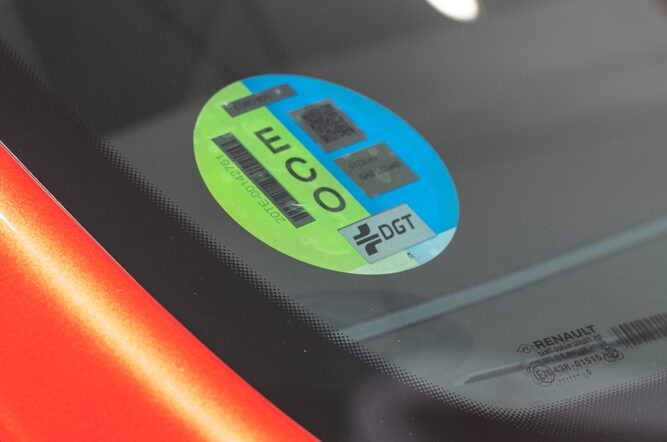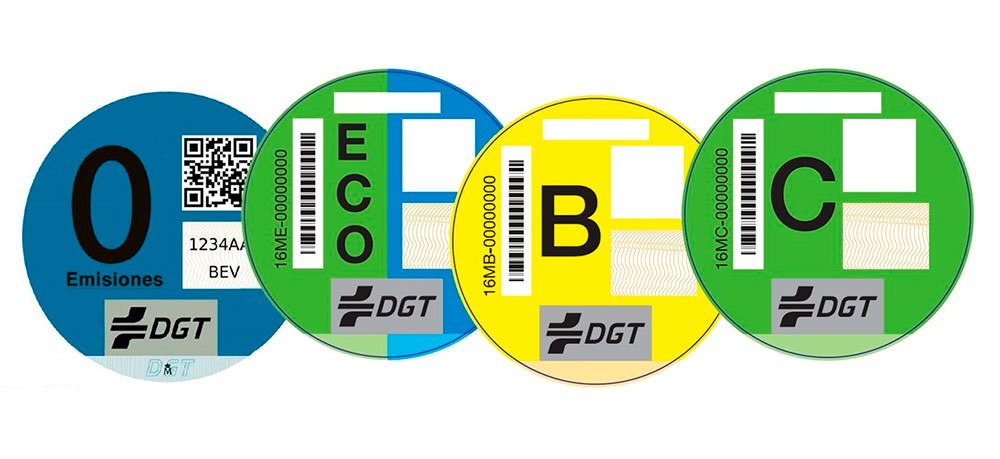- Blog
- Spain’s DGT Environmental Labels – Explanation for Used Car Dealers
Spain’s DGT Environmental Labels – Explanation for Used Car Dealers
DGT emissions sticker spain: Understand vehicle categories, access restrictions, and how upcoming emission zone regulations will impact your business in 2025.

In the global fight against pollution, various countries come up with various solutions. One of them is the DGT emissions sticker. Spain has decided to introduce DGT environmental stickers in an effort to promote sustainable mobility and citizen awareness, offering some benefits in return, such as tax incentives and parking advantages.
For car traders, this new car emissions sticker system may represent an opportunity in managing their inventory. The eco sticker in Spain has become a crucial factor in the automotive market, directly impacting vehicle values, sales potential and urban accessibility.
What are DGT environmental stickers?
You may have been wondering what is the C sticker on cars and what this means for the car and the owner. The Dirección General de Tráfico (DGT) environmental stickers are classification labels that indicate a vehicle's environmental impact based on its emissions.
Introduced in 2016, these labels were implemented as part of Spain's commitment to reducing urban pollution and meeting European environmental standards. The system provides a clear visual indicator of a vehicle's environmental performance, directly impacting where and when vehicles can move within Spanish cities.
4 categories of the DGT environmental labels
The emissions sticker in Spain is placed in the bottom right corner of the windshield and it comes in four versions. Only the Blue sticker offers completely unrestricted rights, and sometimes even free or discounted parking.
ZERO (Blue): Reserved for battery electric vehicles (BEVs), extended-range electric vehicles (EREV), plug-in hybrids (PHEV) with a minimum 40km of electric range, and hydrogen fuel cell vehicles (FCEV)
ECO (Green and Blue): Applies to plug-in hybrid vehicles (PHEV) with a range less than 40km, non-plug-in hybrids (HEV), and vehicles powered by natural gas (CNG and LNG) or liquefied petroleum gas (LPG)
C (Green): Covers petrol passenger cars and vans registered from January 2006 (Euro 4/IV standard), diesel passenger cars and vans from 2014 (Euro 6/VI), vehicles with more than 8 seats and heavy vehicles registered from 2014.
B (Yellow): Includes gasoline passenger cars and light vans registered from 2000 to 2006 (Euro 3), diesel passenger cars and light vans from 2006 to 2014 (Euro 4/5), vehicles with more than 8 seats and heavy vehicles registered from 2005.

Many cities in Spain will have sticker zones
How to obtain DGT environmental stickers
Car traders can get the emissions sticker through multiple channels:
- Official DGT offices
- Authorized Post Office locations (Correos)
- Online through the DGT website (dgt.es) – bulk ordering for multiple vehicles
- Professional automotive associations – often offer discounted rates for members
The cost per sticker is minimal, typically around €5, and they remain valid throughout the vehicle's lifetime.
Why DGT stickers are crucial for car traders
For car dealers and traders operating in Spain, understanding and complying with DGT environmental labels is essential for a few critical reasons.
► Compliance with Spanish Low Emission Zone (LEZ) regulations
Cities across Spain are implementing stricter environmental zones, called Low Emission Zone (LEZ) or Zonas de Bajas Emisiones (ZBE). Traders must ensure their inventory meets local requirements. Non-compliant vehicles face restricted access and potential fines, directly affecting their marketability and value.
► Impact on vehicle sales and marketability
Vehicles with higher environmental ratings will have better market positions and often higher resale values. Traders with environmentally compliant inventory will be able to access all urban areas, providing a significant competitive advantage.
► Rising demand for eco-friendly vehicles
Consumer awareness of environmental issues and LEZ restrictions is driving increased demand for vehicles with high DGT ratings. Traders who stock and promote such vehicles will more easily meet this growing market segment.
Implications for imported vehicles
When you want to import a car to Spain, you need to pay special attention to the DGT classification. This is what you as a trader need to do:
- Verify the vehicle's European emission standard
- Get the necessary documentation proving compliance
- Register imported vehicles with Spanish authorities before applying for environmental labels
- Consider potential restrictions that might affect imported vehicles' marketability
Currently, DGT environmental stickers are issued exclusively to vehicles registered in Spain. This means that imported vehicles must first be registered in Spain, and then you can request the car emissions sticker. If the vehicle meets all national requirements and passes the ITV (Inspección Técnica de Vehículos), it will get a Spanish license plate, and it can receive the appropriate environmental sticker based on its emissions profile.
Impact of low emission zones on the automotive market
The expansion of Low Emission Zones (LEZ) in Spain is transforming the used car market. From 1 January 2025, Madrid will implement stricter LEZ restrictions, affecting over 15,000 vehicles without environmental stickers.
These new restrictions will prohibit vehicles without environmental stickers from entering the M-30 perimeter, for example (Madrid city centre). Fines for non-compliance are €200, so traders must carefully consider their inventory strategy because vehicles without environmental stickers will become increasingly difficult to sell in urban markets.

Spain has an 11% plugin vehicle share
Tips for car traders to stay compliant
As countries introduce environmental measures to fight pollution in big cities, it’s clear that we all need to think about switching from traditional fuels to cleaner solutions – electric and hybrid vehicles. Customers dictate the market, and Spain will surely see a serious change in demand, focusing more on these new-generation vehicles.
The good news is, that’s a great opportunity for you as a car trader! Stocking up on eco-friendly vehicles means you will be ready for the market. You can find thousands of electric and hybrid vehicles on eCarsTrade, most with complete service records and clear history, so the process of registering the vehicles in Spain and getting the environmental labels should be smooth and easy.
Here are a few tips on how car traders can stay compliant with the new Spanish regulations:
- Maintain detailed emission documentation for all inventory
- Regularly check updates on local LEZ regulations
- Consider environmental labels when purchasing inventory
- Analyse market trends in your region to determine the optimal inventory mix by label category
- Calculate the potential resale value considering future emission restrictions
- Focus on vehicles with ECO and ZERO labels for urban markets
Future-proofing your business
As Spain advances toward a greener automotive future, the DGT environmental label system is reshaping the entire market landscape. For car traders, this transformation presents a clear opportunity to position their businesses strategically. The growing consumer shift toward eco-friendly vehicles, combined with urban access restrictions, signals a permanent change in Spain's automotive sector.
By understanding and adapting to these environmental regulations now, traders can build resilient inventories that will meet current demands and be well-positioned for future market evolution.
Nasz bogaty asortyment obejmuje różne marki i modele, aby odpowiedzieć na wszystkie Twoje potrzeby, pozyskiwane bezpośrednio od renomowanych europejskich firm leasingowych, firm wynajmu krótkoterminowego i dealerów:

